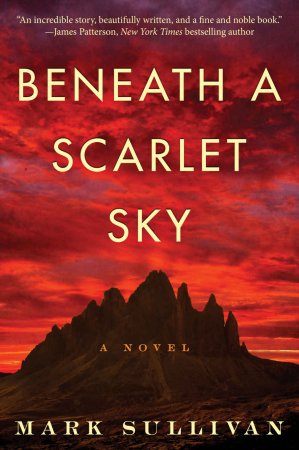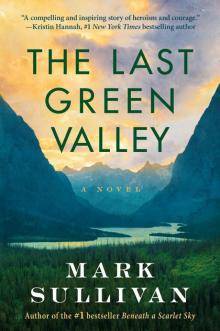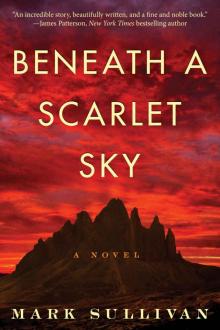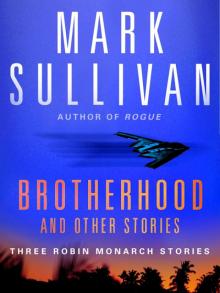- Home
- Mark Sullivan
The Purification Ceremony Page 9
The Purification Ceremony Read online
Page 9
I stayed in the shower so long the water cooled. I tried to tell myself I'd made the right decision in coming here— that events beyond my control had made my relationship with Kevin impossible and that only here, in the forest, could I come to grips with all that had happened before we met.
I had loved Kevin. I still loved him in a way. But the seeds of our connection were based on my need for escape from worlds he could not fathom. Kevin had gone from urban white knight to child stealer in my eyes. I'd gone from stable partner to albatross in his. There was nothing I could do to change that.
But the children. I realized it had been three weeks since I'd held them. I began to cry and I promised their photograph I would figure out a safe and sane way back into their lives.
Overriding my affirmations, however, was the vision of Patterson, a dead young father hanging from a tree, and I stayed in the shower until the water turned to icy nettles.
NOVEMBER EIGHTEENTH
"WIND MUST HAVE blown away the tracks, unless the guy was Tarzan and swung from tree to tree," Griff was saying.
Cantrell was using his binoculars to study the rope marks on the tree limb. "Got to be a strong son of a bitch to hoist someone Patterson's size up there alone with no block or tackle."
I shifted my rifle from one shoulder to the other, noticing in the process how the pale sunlight bore through the forest canopy, dappling the snow and the laden branches, which shed their weight in the light breeze. Three willow ptarmigan flushed from beneath the snow off to my left, cackling before disappearing between two large spruces. I squatted to test the snow consistency, most of it heavy with moisture, some wind-packed, all of it friable. I could not help thinking that it was radiant and peaceful here, a place of beauty.
Only to immediately regret romanticizing what sixteen hours before had been a nightmare. Must have been some kind of reverse psychology at work. I was highlighting the agreeable aspects of this place, rather than face the issue head-on. Not that this wasn't an unusual tactic for me.
At breakfast, Cantrell announced that after dropping off Kurant and Butch, he'd cover for Patterson and take Griff and me out to our hunting grounds. When he returned for us, he'd reported grimly that the radiophone was acting up and Grover, who was something of a savant when it came to electronics, had gone to check the antenna up in the woods behind the lodge. He assured us that Sheila, who was "sacred out of her wits," would call the Mounties as soon as the rig was operable. In the meantime, he wanted to check the tracks around Griff's stand, then return to where I'd found the guide's body before the sign got too old.
The situation made me uncomfortable. But I'd agreed if only to see if I could help determine what had happened. In a strange way, I felt responsible. Patterson wouldn't have been out there if I hadn't requested tracking terrain.
The winter rye field all supported Griff's version of his hunt he day before; we found no footprints beyond a hundred-yard radius around his tree stand. Which relieved some of the tension among us. Now we were trying to figure out how the killer had gotten away from Patterson without leaving any sign.
"I think the killer walked backward out of here in his own tracks," Cantrell said. "That's why they seem to disappear."
I straightened and brushed the snow from my pants.
"Definitely not. Either the wind blew his tracks away or he used a branch to sweep them away. Or both. I vote for both."
Cantrell scowled and crossed his arms. "I been guiding in the woods my whole life and I say he walked out backward."
Cantrell was the outfitter. He needed to assert control, any level of control, over circumstances that were disintegrating and threatened his business. The last thing he wanted was to cede authority to a client, especially a woman client. Still, there was no denying that he was wrong.
I gestured to the clearest set of tracks. "If he walked out backward, the heel portion of the track would be deeper. He'd set his toe first, then rock his weight to the rear. It isn't like that. The weight's rolled forward to the toe in all these prints."
"She's right, Mike," Griff said.
"What makes you an expert?" Cantrell demanded.
"I'm not," Griff said. "But I can see something that makes sense."
Cantrell fumed for a second, then said, "Why'd he use a branch, then?"
"He chose this place because of the wind, but he couldn't be sure that the wind was strong enough to fill in his tracks before I found it."
Griff said, "You make it sound as if he knew you'd find the body."
I told them how, twice the day before, I'd had the sensation of being observed. Cantrell made a distasteful expression with his lips. "What are you, one of them New Age touchy-feely types?"
"It was real," I insisted.
"Yeah, sure, and I'm Elmer Fudd," Cantrell said. He walked away.
"How far could he have swept his tracks?" Griff asked.
"Depends on how fanatical he is, I suppose. But if I'm right, we'll pick up boot prints somewhere within a quarter mile."
Cantrell had climbed up the ridge twenty yards. He was next to what remained of the drag trail. He called out, "There's deer hair here. Explain that. I don't see any damned deer carcass or blood."
We climbed to him, taking care to give the remaining tracks a wide berth. I leaned over and plucked several hairs from the shallow trough. "I noticed this yesterday and thought about it last night. I think he laid Patterson's body on a deer skin, or a couple of them, and used them like a sled to drag him down here."
“Why?"
"I don't know. To confuse us? Because it was easier to move a human body that way? I don't know."
"What's this, then?" Griff asked. He reached out to one side of my tracks and plucked a tuft of thick, grayish-black hair. "It's not deer hair."
I took the fur. I rolled it between my fingers, then sniffed at it. I shrugged and handed it to Cantrell, whose expression changed. "Timber wolf," he said. "Probably a gray-phase Canadian."
"But no wolf tracks," I said.
We all fell silent, considering the possibilities. Overhead, a hawk shriek-whistled. I watched both men. Cantrell had a semiautomatic, open-sighted .223 with him. Griff was carrying a pump-action .30-06 taken from Metcalfe's collection.
We were out here together, but there was no sense that we were in this together.
"We're all watching each other," Griff announced. "I don't like it."
"Man's been killed," said Cantrell. "No amount of goodwill's gonna change that."
"I'll show you where it happened," I said. I led them up the ridge to the burn, skirting the edge as I had the day before, then upslope again into the tight circle of trees where I'd found the gut pile.
I froze when I saw what had happened.
"Jesus," Griff said, turning very pale.
"Wolves been at it," Cantrell said, grimacing at the fury of paw prints in the snow.
I looked up into the sky. It seemed more terrible than anything that had happened so far. I thought of my father. I had to fight to keep down the ball that swelled in my throat.
Cantrell and Griff had already moved off toward the ravine I'd climbed yesterday. "It isn't right to leave it like this," I called. I leaned my gun against a tree. I used my hands as a shovel to throw snow over what was left of Patterson, abandoned so cold and maligned. Wordlessly they joined me until the rest was buried.
When it was done, I led them down the steep embankment, up the streambed and through the poplar thicket to where I'd first picked up the tracks. I was able to study the footprints better in the full light. I took off my glove and touched the bottom where the treads had molded the snow. The front of the track, where the ball of the foot should have been pronounced, was light. I pursed my lips and touched the track again to make sure.
"He's wearing boots that are too big for him," I said.
"And he was stepping very carefully in Patterson's tracks the entire time. That's why I thought I was following one person yesterday."
Cantrel
l asked sharply, "If you made that mistake, who's to say he didn't walk backward up that hill?"
"He didn't," I insisted. "And yesterday I wasn't looking right because I didn't have to."
Griff interrupted. "Why the big boots?"
"I don't know."
Cantrell pointed out beyond the snowberry thicket. "He shot Don somewhere out there. I want to see where."
He went first, weaving around the clumps, fending off the low branches and climbing along a rising shelf. Where the shelf met a bank next to a pile of blowdown tree trunks, we found the place Patterson had taken the arrow. It was dim and thick, just the sort of place you'd expect to jump a big buck. And from the sign, there'd been one here and Patterson had been preparing to shoot at it when he himself was shot. He'd lurched sideways after being hit and crawled on his knees for several feet, then gotten up and stumbled forward. In shock, he'd left his muzzle-loading rifle in the snow, still cocked, ready to shoot, and followed the escaping figure of the deer.
I flashed on the image of Patterson using the deer as his guide, trusting the animal's instincts to lead him away from whoever had inflicted this torment. I fought off the desire to sink inside myself.
This is at least four hundred yards from where he finally dropped," Griff remarked softly.
Cantrell rubbed his sleeve across his chin. "One tough kid."
Cantrell was standing over Patterson's rifle. He picked the musket up finally, squeezed the trigger with his thumb on the hammer and lowered the striker until it was safe to carry. Tears welled in his eyes. He recocked the hammer suddenly, pointed the gun up in the direction of where the arrow must have come from and pulled the trigger. The muzzle-loader went off with a delayed hush and boom. A pine bough fell. He threw the gun. He flailed at one of the tree trunks until Griff took him by the shoulder and led him out of the black-powder haze that lingered in the air.
I climbed the bank and worked the top in semicircles until I found where the killer had stood, then backtracked him. He had stopped several times behind trees, then moved slowly forward on tiptoes. When Griff and Cantrell came up to me, I said: "Patterson was stalked."
Cantrell, who had gotten himself together, threatened to unravel again. "Bastard's got to be quiet and smooth to get up on Don; that kid's woods skills were sharp."
We followed the tracks back along the bank for nearly eighty yards, then out to the edge of an old clear-cut Patterson had passed through and on into a wetland where it appeared the killer had first followed the guide. We left Patterson's track then, focusing on the other. The further into the forest we traveled, the more I wrestled against the urge to turn back; the old-growth trees that had comforted me not twenty-four hours before, were now menacing. After nearly forty minutes of hiking, we came to a stream. Many human tracks trampled the snow there. No footprints sullied the other bank.
"There was somebody else meeting him here," Cantrell said.
Indeed, close inspection revealed two different sets of boot prints: one the killer's with those too-big boots and the air-bob soles. And then these ripple-sole boots, a smaller size.
"Where'd the second guy come from?" Griff asked.
"Upstream," I said. "Met up with the archer and then left together. Where does this stream lead?"
Cantrell got out his map, studied it for a second, then showed us. "It forks up here a half mile or so. One fork heads toward the Sticks, which is pure wilderness. The other, out toward the base of Wolverine Ridge and the fields."
"Where the others are hunting?" Griff asked.
"That's right."
"How long a hike is it in here downstream from their stands?"
Cantrell thought about it. "Four miles to the closest; that would be Earl or Butch. Seven miles to the furthest—the pinko writer there."
"Butch is a bow hunter," Griff offered.
"Yeah, he is," Cantrell said. He looked directly at the older man. "But this stream also runs no more'n six hundred yards back of your stand."
"We've been all around where I spent the day!" Griff protested. "Don't you think you would have found my tracks heading out there?"
"You could have swept the snow clean like he did back there near the body," Cantrell said.
"Well, then, you better go look again!" Griff said. His shoulders had risen under the heavy parka he wore.
"The Mounties will," Cantrell said.
"Good," Griff said. "I've got nothing to hide."
They stood there facing off against each other until I stepped in between them. "Mike, think about it. These tracks are coming into this area, not leaving. We know the killer came in this way, probably with someone else. For Griff or anyone in our camp to have done it, we'd have to find the tracks leading back in this direction.
Cantrell saw what I was saying. We needed to find the killer's escape trail. It was nearly noon by the time we made it back to where I'd discovered Patterson's body. The wind had picked up. Clouds threatened.
"We'd better find his exit trail fast," Griff said. "Or it's going to snow and we're going to lose it all."
Cantrell suggested a trick he used for locating wounded deer. We spread out fifteen yards apart. We walked parallel arcs through the woods west of the tree where Patterson had been hung. At the completion of each arc, we moved farther east and expanded the semicircle. On the third set of arcs, perhaps one hundred and seventy-five yards from the tree, Griff cut the big-boot track and we ran it all the way east to the Dream, where, to our astonishment, we came upon the same set of rippled-sole boots we'd seen earlier that morning exiting the tributary of the Sticks.
We decided to go north along the bank to see if either man had exited the water to cut cross-country toward the other clients. We spread out again, Cantrell at the riverbank, Griff in another seventy-five yards and me another seventyfive yards west still.
We moved north through the same country I'd traversed a day and a lifetime before. We communicated with hand signals to keep us in a parallel march. I became conscious of the snow. It pushed up the bottoms of my pants and into the tops of my boots. It sloughed off tree limbs, melted at the nape of my neck and trickled like a spring snail down my back. It lifted on the wind and pricked my face.
For many minutes I had only the awareness of snow and sweat and the demands of scanning the forest floor for fresh tracks. I checked my back trail, squatted every now and then to peer forward through the understory of spruce and larch, hoping to glimpse movement—a man, a wolf, I don't know.
We traveled half an hour this way and I dropped fully within the ebb and flow of skirting stumps and slipping over logs. The air in the woods seemed strangely electric after yesterday's storm and in anticipation of the one to come.
Yet there was very little sound save for the flitting of chickadees and the raucous cry of scrub jays, and several times the snort-wheeze of deer I pushed from beds. I felt an unreasonable happiness that I suppose came from doing something I knew how to do. It occurred to me that my father would have had a different explanation: he used to say that in each hunt there were moments when the hunter's sensitivity was so acute that time seemed to stand still and the secrets of the forest were revealed.
For my father and Mitchell, the deer hunt was a drama of Power. Not power in the political sense of hunter and prey, but Power in the Micmac sense; that is, the deer hunt was an act of creation, a reflection of the fluid, continuous state of transformation between life and death in which we lived. The Micmac stories I heard over the years always took place here, deep in the forest, for in the real forest and in the forest of our minds we encounter Power. The old Micmacs hunted moose. But Mitchell and my father found the whitetail to be a much more challenging manifestation of Power. The deer and its tracks were but shadows of the spirit we stalked, but by learning to engage with the deer, we learned how to conduct ourselves correctly in the presence of Power.
"Don't fall into the trap of having a purpose in the woods, Little Crow," Mitchell once told me. "Having a purpose says you are ma
king the woods yours, which is foolish. The woods are the woods. What you have to do is find a way to just be in the woods so the woods accept you. When you do, you'll be like a mirror, reflecting everything around you. You'll sense worlds that are invisible to most people these days."
I was wondering whether I was "just being" when it seized me again, the sensation that I was under observation. I stopped on the back side of the trunk of a big ponderosa. I took up my binoculars and investigated the sidehill. I cradled the gun. My thumb came to the safety.
I swept the field glasses back and forth, too quick to be of much use. I dropped them to my breast. I closed my eyes to see if I might enter into just being and so better understand where the watcher's energy was coming from. It took a few moments, then a dull, not-unpleasant throb appeared at the nape of my neck. The throb moved around and up the side of my face. I saw clearly the hillside off to my left. I opened my eyes and turned slowly, looking angularly up the hill through the glasses toward a stand of poplar.
"Unbelievable," I said to myself. "Absolutely unbelievable."
Two huge animals, their bodies so cylindrical and heavy that their legs appeared stunted. Their necks were one and the same as their shoulders, swollen all the way to the flesh where ears met heads. Unmoving on the hillside. Breath came in pillows from their muzzles, melting like blown fog among the treelike branches of their upswept horns.
The gun came from its cradle of its own accord; and I had in the scope the high shoulder of the biggest one, the one with the myriad boss of antlers, the one that had just taken two plunging bounds up the hill before turning statue again. I aligned the crosshairs and was squeezing the trigger when I had the sudden, awful thought that maybe these were not the source of my unease.
A fear unlike any I have ever known came over me then. It was a pressurized thing, steady, unfolding and insistent at the back of my knees and around my shoulder blades. It squeezed my ribs until I thought I had lost the capacity to breathe. I felt surrounded and gnawed at and stranded. I wanted to sprint, to clamber up a tree and hide. I wanted to lie down in the snow and bury myself. I wanted to shoot the rifle, run the bolt and shoot again. At anything that moved. At anything that didn't.

 Beneath a Scarlet Sky
Beneath a Scarlet Sky The Last Green Valley
The Last Green Valley Beneath a Scarlet Sky: A Novel
Beneath a Scarlet Sky: A Novel Brotherhood and Others
Brotherhood and Others The Purification Ceremony
The Purification Ceremony